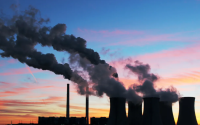6 June 2006USNews.comMarianne Lavelle
General Electric's new environmental push, dubbed "Ecomagination," features a TV commercial showing an elephant so animated by the industrial giant's clean technology he dances to "Singin' in the Rain." GE can claim some fancy footwork, indeed, since its high-profile plan to cut its own greenhouse-gas emissions and boost environmental technology spending, along with similar recent moves by key businesses, has begun to shift the political landscape in favor of action on climate change.
But it takes a special kind of imagination to envision the Bush administration and a Republican Congress enacting a law to address global warming. Although it's not certain GE provides the needed thrust, the issue is sure to move front and center when the Senate takes up an energy bill in the coming weeks. Several legislative proposals are expected to include provisions to curb carbon dioxide and other emissions created by the burning of coal and oil. Scientists say these so-called greenhouse gases trap heat in the atmosphere, altering global weather patterns and increasing the risk of rising sea levels, cropland loss, and drought. But Congress won't be won over easily: Among its ranks are many skeptics of the science behind global warming and others who support the Bush administration's view that mandatory greenhouse-gas cuts are too costly.
As a result, the Kyoto treaty on climate change went into effect earlier this year in 140 nations but not in the United States, the country that is the largest emitter of greenhouse gases. However, a growing number of business leaders--most recently GE Chief Executive Officer Jeffrey Immelt--have called for the United States to set clear goals on carbon emissions. Most industry supporters would prefer a market-based system like that in the Kyoto treaty, one that would cap carbon emissions and create a market where businesses can buy pollution credits from the government and then trade them among one another. It would imitate a model that has proved successful in controlling sulfur dioxide emissions to reduce acid rain in the United States.
Most power companies still fiercely oppose mandates. But utilities that generate a large portion of their power through carbon-free nuclear energy are more amenable, as they would clearly gain in a system where they could sell credits to their coal-fired competitors. And with nine northeastern states contemplating regional regulations on carbon emissions, potentially putting their own utilities at a competitive disadvantage, some utilities in those states prefer the idea of a federal regime that creates a level playing field nationwide. "I think we're very close to a tipping point of support in the business community," says Ralph Cavanagh, codirector of the energy program at the Natural Resources Defense Council. "And clearly that is what it will take to do it with this administration and this Congress."
Revenue raiser. Prior to GE's green PR blitz, chief executives of three of the nation's largest utilities also said carbon regulation was inevitable, with proposals ranging from a carbon tax to emissions caps. However, Immelt was careful not to endorse any specific proposal when he said GE would double its investment in technologies that help its customers--including the big utilities--produce fewer emissions. But he frankly admitted the goal was not altruistic, as the company aimed to double its revenue from clean technology to at least $20 billion in 2010. "We think green means green," Immelt said. "This is a time period where environmental improvement is going to lead toward profitability. This is not a hobby to make people feel good." Federal carbon standards, for example, would create more demand for GE technologies in wind power, natural gas turbines, cutting-edge coal gasification, and, most controversial, nuclear power plants.
New nuclear development has been stymied in the United States. But GE has enjoyed a steady business upgrading existing plants. With the administration touting nuclear as carbon-free energy, GE plans to submit its design for a new-generation nuclear power plant that it says will be cheaper and have additional safety features. Greens remain divided over waste and safety issues, but some hope nuclear gets Capitol Hill elephants to dance some new steps on global warming.






